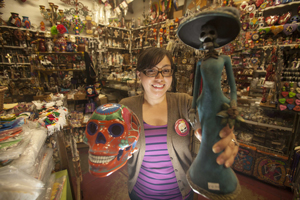Some merchants in L.A.’s oldest shopping district have turned to one of the newest methods of fundraising: Kickstarter.
The Olvera Street Merchants Association Foundation, a nine-year-old non-profit representing about half the roughly 60 merchant families on Olvera Street near downtown Los Angeles, is using Kickstarter instead of city funding to foot the bill for this year’s Dia de los Muertos, or Day of the Dead, events.
The move to raise money privately, rather than use city funding, came as the group sought to keep its freedom to pick the entertainment for this year’s festival, which will run from Oct. 25 to Nov. 2.
The Olvera Street celebration of Day of the Dead, a Mexican holiday in which families remember the deceased, annually attracts thousands of visitors. In recent years, the merchants hired the musicians, dancers and other entertainers and otherwise arranged the festivities, and the city wrote out a check for it. However, the city essentially changed its mind this year and notified the Olvera merchants that the City Charter mandated a competitive bidding process and the city would need to hire the event planners.
The merchants, fearing their festival could be hijacked by a promoter, decided to forego public funds. That meant they had retained control, but they had no money for the events. That’s when they turned to the online donation-raising service.
“We decided in lieu of the bidding process, to ensure that we were the ones doing the events, to fundraise on our own,” said Christina Mariscal-Pasten, a founding board member in the merchant’s association whose family runs Myrosa Enterprises, a store on Olvera that sells Day of the Dead goods.
Mariscal-Pasten said it will cost around $18,000 to put on the day’s events. As of late last week, the group had exceeded its $9,999 target, raising $12,250 by the end of the 45-day funding effort Sept. 26. Most of the money came from smaller donors who gave less than $100. Two donors, Mariscal-Pasten’s father and another Olvera store owner, each gave $1,000 toward the campaign. Another contributor, whom she described as a member of the public but declined to name, gave more than $1,000.
Mariscal-Pasten said PayPal donations and dues from the merchants association would be sought to cover costs beyond the amount raised through Kickstarter.
Keeping it real
Olvera Street lies at the heart of El Pueblo de Los Angeles Historical Monument, the site where the city’s original 44 settlers established the community in 1781. Christopher Espinosa, general manager of the city entity that runs and maintains Olvera Street and the surrounding museums and parks, said Day of the Dead is one of the street’s more popular events.
“We get thousands of people out here,” he said. “It promotes business activity. You’ll see it builds and builds with more people each night until the final night, at least 5,000 people come out.”
Espinosa said raising money privately to fund the program would help preserve the event’s spiritual undertones.
“There’s little commercial activity in this grassroots event, so they made the decision to turn to Kickstarter,” he said.
But, he added, it might be difficult for the merchants to turn to fundraising every year; they might need to find one or more corporate sponsors in future years.
“I would expect to see some commercialism brought into it. It’s difficult to raise funds for every single event,” Espinosa said.
Dov Lesel, an assistant L.A. city attorney, said if the event were funded by the city, the vendors would have to be chosen by competitive bidding. Turning to Kickstarter was a perfectly appropriate response because that fundraising is the same as if the merchants association paid out of its own pockets.
“The bidding process is mandated by the City Charter,” he said. “It ensures we’re getting the best price that we’re contracting for and that these services are open to everyone. They aren’t just funneled into a single group of people.”
Mariscal-Pasten conceded that the event benefits her family’s store since it specializes in Day of the Dead goods. But the event is important to all the merchants in the small historic district. In addition, opening the process to the lowest bidders ran the risk of having to contract with companies that lacked cultural sensitivity and would commercialize the event, which goes against Olvera’s goal for providing authentic Mexican experiences.
“This is one of the few events that you don’t see booths promoting private business,” Espinosa said. “It’s a very organic, highly spiritual event with integrity. That’s why I think a lot of people come here. We have to be very careful in how far we’re going to commercialize.”

